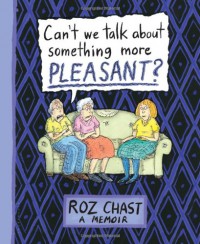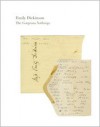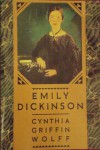Currently reading
Saints in Art
The Gorgeous Nothings: Emily Dickinson's Envelope Poems
Selected Poems
Emily Dickinson
Lies My Teacher Told Me : Everything Your American History Textbook Got Wrong
Gone with the Wind
Can't We Talk about Something More Pleasant?: A Memoir
 For as far back as I can remember, I felt far outside my parents' duo. There were many times, from when I was a little girl until just a couple of weeks ago, that I was sure I was adopted. ...Adoptees or not, they were my one and only set of parents, and now they are gone, a fact that feels indescribably strange, even four and six years after their deaths.
For as far back as I can remember, I felt far outside my parents' duo. There were many times, from when I was a little girl until just a couple of weeks ago, that I was sure I was adopted. ...Adoptees or not, they were my one and only set of parents, and now they are gone, a fact that feels indescribably strange, even four and six years after their deaths.This is the story of the end of three lives: Roz Chast's mother, her father, and her hope that either of them can be the parents she needs. That last one took the longest to die.
There is a great deal of humor here, and none of it feels forced.
There is also much unflinching honesty, and none of it feels TMI -- although if you don't feel up to the unpretty details of extreme old age and end-of-life existence, you shouldn't read this book.
Chast is as straightforward about her own flaws as she is about those of her parents, which makes this portrait of all three of them morally acceptable. She also can't help viewing the lives and deaths presented here through the lens of art and humor, which makes this book brilliant.
I'm surprised and a little disappointed that she didn't reflect upon her own life as a parent -- not in a way that would betray her children's privacy, but simply to wonder what their journey will be like when she dies. But, as she seems to imply in the quote above, she's still too stunned by what she's been through to do anything but look back at it in blank amazement.
Well, not quite blank. There's this book, after all.
But it's the story of an uncompleted voyage. Her parents' cremains sit unpoetically in her closet. Partly because she likes having them there -- she says so:
I like having my parents in my closet.
(Even in context, this is a rather terrifying quote.)
Partly for practical reasons -- where else would they go?
The thought of burying their cremains in an arbitrary hole in the ground does not appeal to me. We don't have a family plot, so choosing one cemetery over another seems random. Throwing their ashes off the side of a boat makes as much sense to me as tossing them in a wastebasket at Starbucks. And decanting them into a decorative urn placed on the mantelpiece in the living room is just...ugh.
But mostly because she's simply not done with her parents yet. She remembers her father "with great affection," but is "still working things out" with her mother. Her mother was a talented, humorous woman who loved her daughter but loved being right more. She did not "pick her battles," as parents are advised to do now. She pushed having her own way, always, and she always won. But in doing so, she lost her daughter's trust.
She probably wanted things to be otherwise between them. Chast certainly did -- and still does.
And there's the rub. Her mother is dead, and time travel is impossible, so there's nothing to be done but try to let go of the past. And how many of us are able to do that?
Maybe when I completely give up this desire to make it right with my mother, I'll know what to do with their cremains. Or, maybe not.
Quite aside from loving Roz Chast and feeling honored by this chance to know more about an artist I've admired for so long, I was glad to learn a bit about what living a long life might really mean, both to me and to my offspring. Part of me still wants to shoot for 100. The rest is a lot more reconciled to checking out early.
Read this book. Time it carefully so you don't ruin a splendid mood, but read it.








